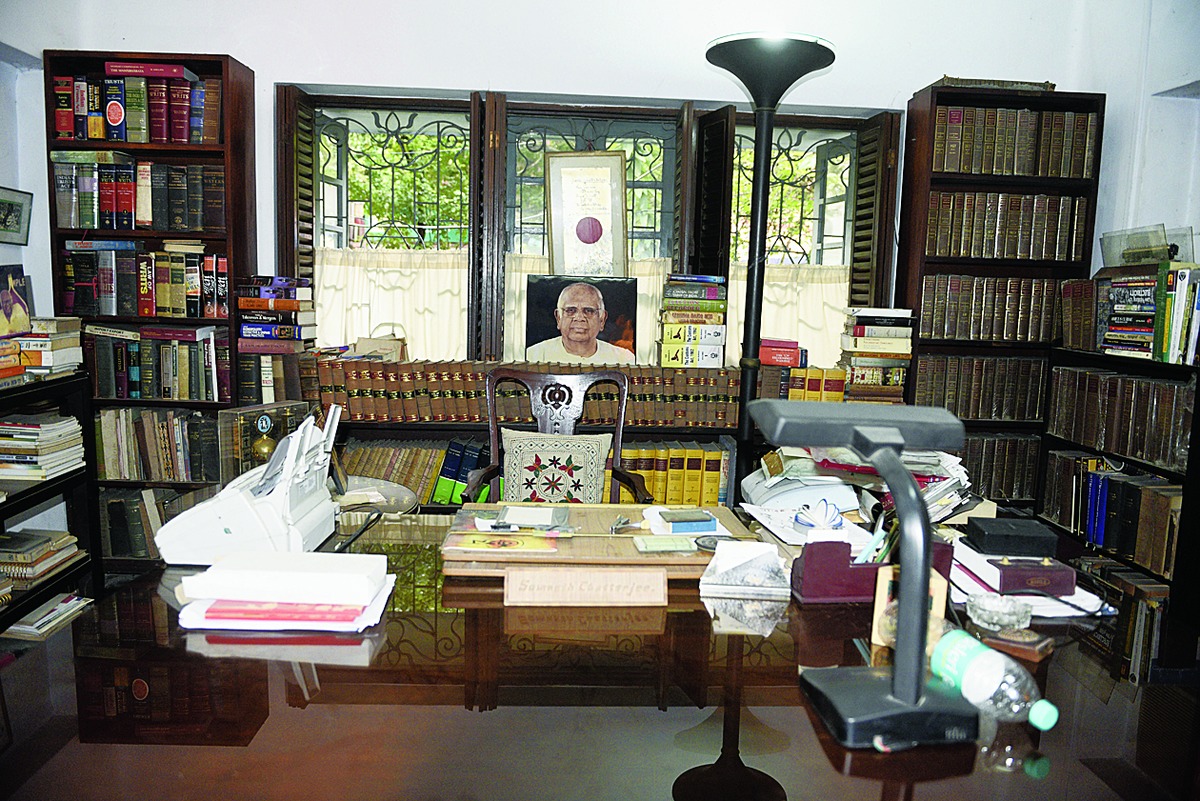
Lore has it that when he rose to present his case in the high court, the lawyers representing the other side and the judges would freeze. The high court para also has stories about how some Opposition lawyers would start stammering on seeing him on the other side.
But once the formidable lawyer would wrap up his arguments with deft logic and classy wordplay, the barrister with baritone would become "Somnath-da" for all.
Politics kept Somnath Chatterjee away from the Bar since the early 1990s, but some of his protégés ruled the courtrooms, both as lawyers and judges, across the country.
"What do I say? I lost my guru today," said an emotional Anindya Mitra after paying his last respects to his mentor.
Former Lok Sabha Speaker Somnath Chatterjee, a 10-time Lok Sabha member, breathed his last at 89 at a private hospital in Calcutta at 8.15am on Monday. He was taken to the high court, where he had a successful stint between 1974 and 2004, on Monday afternoon where Chief Justice Jyotirmoy Bhattacharya placed a wrath on his mortal remains.
The next stop was the Assembly and several judges, including the chief justice, and chief minister Mamata Banerjee walked behind the hearse.
"I had connections with him since 1972 when I was a junior lawyer. He was a very sharp lawyer, an affectionate human being and great protector of juniors and colleagues in the profession," recounted retired Supreme Court judge Asok Ganguly.
Born in Assam's Tezpur on July 25, 1929, Chatterjee was the youngest of the five children of Nirmal Chandra Chatterjee and Binapani Debi. Chatterjee studied at Mitra Institution School, Presidency College and the Calcutta University, before going on to attend Jesus College, Cambridge.
He was called to the Bar from the Middle Temple in London and practised law from 1954, as an advocate at the Calcutta High Court, before a career in active politics.
According to Justice (retired) Ganguly, had Chatterjee not drifted to politics, the story would have been different. "He would have been among the top few lawyers in the country," added Justice Ganguly.
Chatterjee, however, chose politics, as he wanted to make a difference. When his juniors would ask him why he left such a flourishing career -Chatterjee would not even accept briefs from the management side in cases against workers - he would always argue that good people should be in politics.

That's why in 1968, when CPM stalwart Pramode Dasgupta handed Chatterjee a membership form, asking him to fill it up and give it back to him, the then 39-year-old Chatterjee did so readily and became a member of the Marxist party for the next four decades.
Although the CPM expelled him in 2008, Chatterjee, till his last day, felt for the party. Though his family members were not happy with the manner the party dealt with him, he did not dump the party.
His father was a lawyer, juror and three-time Lok Sabha member, who had served as the president of the All India Hindu Mahasabha, an ideological forerunner of the BJP, who later on leaned towards the Left.
The son, however, was drawn to the Marxists from the very start of his political life. Though the high-nosed class-conscious comrades in Alimuddin Street and A.K. Gopalan Bhavan considered him as an outsider, he remained a committed comrade. He had to wait for 30 years to get a central committee berth in 1998, but the bhadralok was not bitter about it.
In 2008 came his controversial expulsion from the party - over his refusal to toe the party line and vote against the UPA-I government, despite holding the non-partisan chair, in a July 2008 no-confidence motion over an Indo-US nuclear deal - while he was still the Speaker of the Lok Sabha. Chatterjee, on several occasions, said later that the expulsion was one of the "saddest days" of his life.
"I have done what my conscience and the Constitution dictated," he had said later.
Despite attempts by former Bengal chief minister Buddhadeb Bhattacharjee and others in the Bengal lobby of the CPM to bring "Somnathda" back to the party, it never happened. Chatterjee, however, said on several occasions that he would remain a Marxist till the very end.
Chatterjee had first won as an Independent, backed by the CPM, in a 1971 bypoll from Burdwan, when his father passed away as the incumbent. Ahead of his first public speech - he went on to deliver over 500 in Parliament alone, besides another 350-odd elsewhere as Speaker between 2004 and 2009 - during the 1971 campaign, Dasgupta had turned up to personally introduce the "England-returned barrister to the electorate of mostly peasants and labourers.
From 1977, he was fielded from Jadavpur, till he lost in 1984 - his only defeat in a general election - to Mamata Banerjee. From a bypoll in 1985 till his retirement from parliamentary politics in 2009, Chatterjee won seven consecutive Lok Sabha elections from Bolpur. Barring 11 months in the 1984-85 period, he spent 39 years in the Lok Sabha.
A football fan, who played as a forward for a local club in his youth, Chatterjee attended several World Cup matches between 1994 and 2006, used to admire Argentine stalwarts Diego Maradona and Lionel Messi and found Portuguese superstar Christiano Ronaldo "too arrogant". Closer home, he was a lifelong fan - and member for decades - of Mohun Bagan Club.
On February 7, 1950, Chatterjee married Renu Chatterjee, with whom he had daughters, Anuradha and Anushila, and a son, Pratap. On a number of occasions, he had stated that he always counted on two pillars of support during crises, Renu and CPM patriarch Jyoti Basu, his political mentor.












